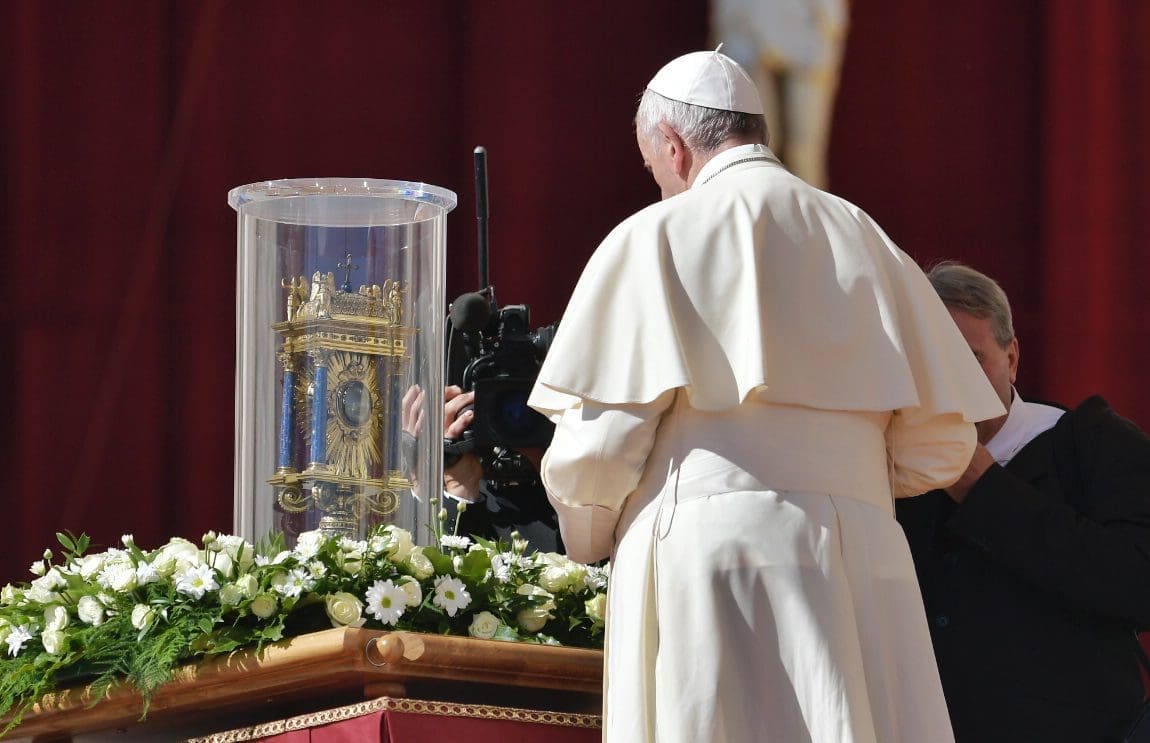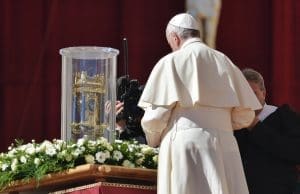Papal Audience
on the occasion of the 400th anniversary of the Vincentian Charism
Dear brothers and sisters, good morning!
Thank you for your warm welcome, and thanks to the Superior General for introducing our meeting.
I greet you and together with you I thank the Lord for the four hundred years of your charism. San Vincenzo has created a momentum of charity that lasts for centuries: a momentum that came out of his heart. For this reason today we have here the relic: the heart of St. Vincent. Today, I would like to encourage you to continue this journey, proposing three simple verbs that I believe are of great importance to the Vincentian spirit, but also for the Christian life in general: to worship, to welcome, to go.
ADORE
Adore. There are innumerable invitations by St. Vincent to cultivate the inner life and to devote himself to the prayer that purifies and opens the heart. Prayer is essential to him. It is the compass of every day, it is like a manual of life, it is – he wrote – the “great book of the preacher”: only praying draws from God the love to pour into the world; only praying touch the hearts of people when announcing the Gospel (cf. Letter to A. Durand, 1658). But for Saint Vincent prayer is not just a duty, and much less a set of formulas. Prayer is to stand before God to be with Him, to devote himself to Him alone. This is the purest prayer, the one that makes room for the Lord and his praise, and nothing else: adoration.
Once discovered, adoration becomes indispensable because it is pure intimacy with the Lord, which gives peace and joy, and melts the sorrows of life. Therefore, to someone under particular pressure, Saint Vincent also advised being in prayer “without tension, turning to God with simple glances, not trying to have his presence with sensitive efforts, but abandoning himself to Him” (Letter to G. Pesnelle, 1659).
Here is the adoration: stand before the Lord, with respect, with calm and in silence, giving Him the first place, abandoning himself confident. Then ask him that his Spirit comes to us and let our things go to him. So also needy people, urgent problems, difficult and difficult situations fall into adoration, so that St. Vincent asked “to worship in God Even the reasons they are trying to understand and accept (cf. Letter to F. Get, 1659). Those who worship, those who attend the living source of love can only remain, so to speak, “contaminated”. And he begins to behave with the others as the Lord does with him: he becomes more merciful, more sympathetic, more available, exceeds his stiffness, and opens to others.
WELCOME
And so we come to the second verb: welcome. When we hear this word, we immediately think of something to do. But actually accepting is a deeper layout: it does not just require someone to put it, but also be welcoming, available, accustomed to others. Like God for us, so we for the others. To accept means to resize my self, to straighten the way of thinking, to understand that life is not my private property, and time does not belong to me. It is a slow detachment from all that is mine: my time, my rest, my rights, my programs, my agenda. Whoever accepts giving up on the ego and making you and us enter our lives.
The welcoming Christian is a true man and woman of the Church because the Church is Mother and a Mother welcomes and accompanies her life. And as a son resembles the mother, carrying the traits, so the Christian carries these traits of the Church. He is then a truly faithful Son of the Church who is welcoming, who without complaint creates concord and communion and generously sows peace, even though it is not reciprocated. St. Vincent helps us to enhance this ecclesial “DNA” of acceptance, of availability, of communion, because in our lives “all bitterness, anger, wrath, shout, and malice with all sorts of malice” are lost “( Eph 4:31).
GO
The last verb is to go. Love is dynamic, it comes out of itself. Whoever loves is not in the armchair to look, waiting for the advent of a better world, but with enthusiasm and simplicity it gets up and goes. St. Vincent said well: “Our vocation is therefore to go, not in a parish, and not just in a diocese but throughout the earth. And to do that? To inflame the hearts of men, doing what the Son of God did, He who came to bring fire to the world to inflate him of his love “(Conference May 30, 1659). This vocation is always valid for everyone. Ask each of the questions: “Do I meet others, as the Lord wants? Port where do I go this fire of charity or else shut up to warm me in front of my fireplace?”
Dear brothers and sisters, thank you for moving in the streets of the world, as Saint Vincent would ask you today. I hope not to stop you, but to continue to draw from the adoration every day the love of God and spread it in the world through the good contagion of charity, availability, and concord. I bless you and the poor you meet. And I ask you, please, the charity not to forget to pray for me.
14 October 2017
Pope Francis
Tags: Famvin400, Papal Audience, Pope Francis, Symposium




